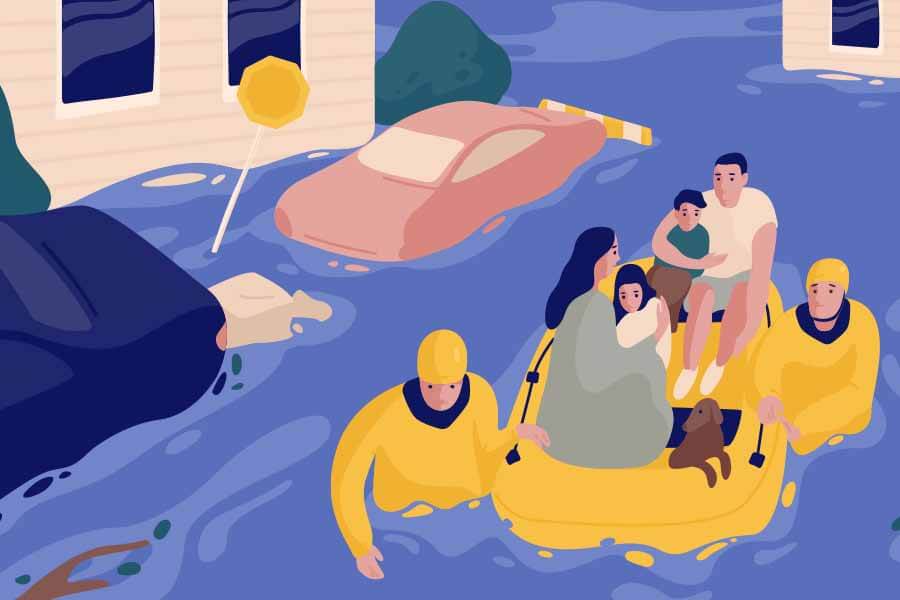
Updated 2-20-24. Natural disasters can leave Notaries and their signers facing a slew of paperwork problems. Notaries might find themselves with lost or damaged supplies. Signers may need documents urgently notarized but lost their IDs. Here are some tips to help prepare for a natural disaster and be ready to help signers in need.
- Store your Notary seal and journal where they won't get lost or damaged
- Follow your state laws when replacing lost and destroyed Notary seals
- If signers have lost their IDs, know the alternatives to identify them
- Remember you don't have to charge full price for your services
1. Store your Notary seal and journal where they won’t get lost or damaged
You’re going to have problems performing notarizations if your seal and journal are lost, destroyed or made unusable in a natural disaster. The best way to protect your tools is to store them in a secure area that won’t be affected by severe conditions in your area. Here are some suggestions:
If you live in a state with frequent tornado activity, such as Kansas, Oklahoma, or Texas, it may be prudent to store your tools where you can reach them easily and they will be protected if you have to take shelter in a hurry. For example, if you use your basement or cellar as a shelter in the event of a tornado, you may want to consider storing your Notary tools there as well.
If you live in a region that experiences hurricanes or flooding, such as Florida, consider storing your seal and journal in a high place where water is less likely to reach in the event of a flood, and avoid leaving your tools in your car or other locations vulnerable to water damage. You may want to consider purchasing a waterproof safe.
Conversely, if you live in an area where fires are common, such as California, a fireproof safe is a good place to store your seal, journal and other essential items you don’t want to lose in a disaster.
2. Follow your state laws when replacing lost and destroyed Notary seals
If your seal or journal is lost or damaged during a disaster, ensure you know the proper procedure for reporting and replacing your tools. California and Texas require Notaries to notify the Secretary of State in writing if a seal or journal is lost or damaged. Florida also requires Notaries to notify the Department of State in writing if a seal is lost.
3. If signers have lost their IDs, know the alternatives to identify them
Following a disaster, many people have lost important possessions, and often this includes their ID, so you will need to find other options to identify them. Except in California, every state allows a signer to be identified by personal knowledge, so if you are sufficiently familiar with the signer — for example, if the signer is a good friend or long-time co-worker — personal knowledge may be used to verify the signer’s identity.
Another option is using one or more credible identifying witnesses who can vouch for the signer’s identity if they lack other satisfactory identification. However, be aware that credible witness requirements are different in each state. Some states, such as Pennsylvania, require a credible witness to personally know both the Notary and the signer. Others, such as California and Florida, allow the use of two signers who do not know the Notary personally but do know the signer and present proof of their own ID (such as a driver’s license). Florida Notaries require a sworn written statement from credible witnesses swearing or affirming the signer’s identity, that the witness has no interest in the transaction and that the signer lacks other forms of ID.
Keep your state Notary handbook handy or check with the NNA’s State Law Summaries for guidance. The NNA Hotline also is available to help.
4. Remember you don’t have to charge full price for your services
Another way you can assist signers in a natural disaster is by reducing or waiving your fee. Victims of disasters often suffer significant financial losses and require a great deal of notarized paperwork to file insurance claims, request aid and replace lost property. No state requires you to charge your maximum fee each time you notarize, and most permit you to waive your fee altogether if you choose to do so for a signer in need.
David Thun is the Editorial Manager at the National Notary Association.
Related Articles:
NSA Tip: Preparing for things to go wrong